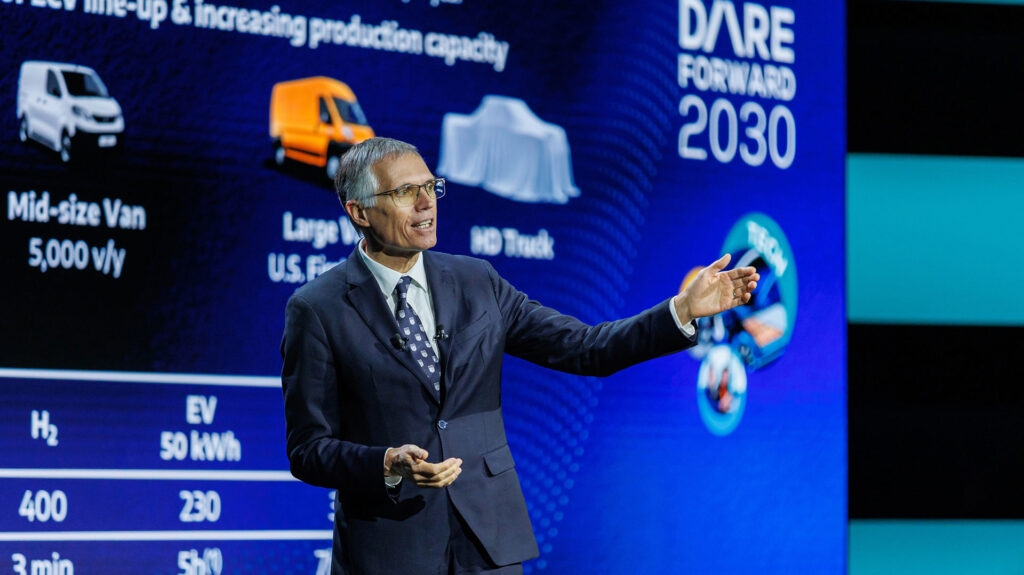They compete on the French and world automobile market. But once together in an interview, the two big bosses of Renault and Stellantis share a common vision and the same concerns.
Le Parisien newspaper brought together Carlos Tavares, CEO of Stellantis, and Luca de Meo, CEO of the Renault group for a cross interview. The article published on 1er October 2022 covers many topics: the future of the electric car, Chinese competition, the semiconductor crisis, autonomous driving and even car sharing. We note that the two bosses share a number of common points on the subjects discussed. The two men know each other well.
If Carlos Tavares – boss of 16 brands including Peugeot, Citroën, DS, Fiat, Alfa or Jeep – is always quite pessimistic, Luca de Meo – CEO of Renault, Nissan, Dacia – rounds the angles a little more. In the end, there are more elements that unite them than there are that oppose them.
The shift to the electric car no longer offers a rollback
Carlos Tavares and Luca de Meo do not hesitate to share certain concerns. We note in particular that now that they have launched ” full pot ” on the electric, there will be no turning back possible. By their speech, the two bosses do not want to be criticized for braking on the electric, they simply want to alert on the hidden side: ” Full Pot! But, we also tell you what’s under the carpet… clarified Luca de Meo.
The boss of the Stellantis group also underlines his fear that governments will make the same mistake as with diesel a few decades earlier.
Hybrid, hydrogen and other alternative fuels work is sidelined, considering only “tank-to-wheel” emissions and not the entire production cycle. Both men worry that the door is closed to other innovations, and that the door is opened to other problems.
Price of vehicles too high and increase in taxation to be expected
Throughout the discussion, Carlos Tavares notes that fuel taxes bring in a lot of money for the State: 450 billion euros. What will happen when the transition to electric is made? Electricity taxation will likely be targeted to offset the loss. The boss of Renault did not rebound on this question and on these assertions.
However, Luca de Meo develops another point: the new electric car is mainly aimed at privileged people, who often have a garage and a charging station at home. It’s like the first iPhone, released in 2007. It was aimed at a niche of customers before it became popular. He still intends to democratize electric vehicles without saying more about the target deadlines. Carlos Tavares, for his part, is worried that the electric car will become an elitist vehicle, which even the middle class will not be able to access.
The affordable car, promised at 100 € by the government, leaves them for the moment a little on the reserve.
Chinese competition from low-cost electric cars
The two bosses display a relative disagreement on the question of Chinese competition. Carlos Tavares sees the low-cost Chinese car as a threat. Chinese manufacturers have taken 10 years ahead of the electric and are now landing in Europe, which could have consequences for the European automotive industry and employment.
For his part, Luca de Meo sees it more as a challenge. We will have to work to catch up. If the arrival of Japanese or Korean vehicles had little impact on European manufacturers, who then dominated their subject, with the electric vehicle, the cards are reshuffled.
The two groups also remain bogged down by the semiconductor crisis, where Chinese brands seem to have more resources. Like Volkswagen boss Carlos Tavares sees no improvement in the chip shortage until the end of 2023.

“The level 5 autonomous vehicle (without driver), I think it’s a utopia”
Luca de Meo does not really believe in completely autonomous driving (level 5). There is firstly the regulatory aspect, but also that of the ethics of the algorithm and responsibility in the event of an accident: “ We are working on the autonomous car, but I really don’t want to be the first manufacturer to put one on the market. »
The question also arises at the level of the target of these vehicles. If autonomous taxis can save a significant wage bill for the companies concerned, there does not seem to be an outlet for individuals.
Carlos Tavares indicates that level 3 autonomous driving will be available within 2 to 3 years in the group’s vehicles. He joins Luca de Meo for levels 4 and 5, which are aimed more at company fleets than at individuals.
From autophobia to the creation of a forum for freedom of movement
The two big bosses, car lovers, do not want the car to become just one more household appliance. They note that the automobile is taken in dislike in the large agglomerations: ” I’ve always said that if people start hating our product, it’s game over. ,” says Luca de Meo.
He emphasizes that the issue of infrastructure (roads as charging solutions) is crucial: “ This road was built maybe 450 years ago. Running clean cars on it is like watching a Netflix movie on a cell phone from twenty years ago. »
Carlos Tavares agrees with this and adds: “ We are there to propose solutions, provided that society accepts that individual, family and professional freedom of movement remains a fundamental axis of our “lifestyle”. Will society accept it tomorrow? and to add that to launch the debate, he wants to create a forum for freedom of movement, to which Luca de Meo will of course be invited.
